
Turkiye Jeoloji Bulteni-Geological Bulletin of Turkey
Scope & Guideline
Advancing geological research for a sustainable future.
Introduction
Aims and Scopes
- Geological Research and Modeling:
The journal focuses on various aspects of geological research, including geodynamic modeling, structural geology, and the analysis of tectonic processes. This includes the development of models to understand plate motions and topography. - Geochemistry and Mineralogy:
Research related to the chemical and mineralogical characteristics of rocks and minerals is a core area of the journal. This includes studies on the geochemistry of volcanic levels, mineral deposits, and the evaluation of geological resources. - Geomorphology and Environmental Geology:
The journal covers geomorphological studies that explore the evolution of landforms and the impact of geological processes on the environment. This area includes investigations into natural formations and their implications for geotourism. - Paleoclimate and Sedimentology:
Research into past climate conditions and sedimentological studies is also a focus, with an emphasis on understanding climatic fluctuations and their geological implications over time. - Geological Hazards and Risk Assessment:
The journal addresses the study of geological hazards, including landslides and earthquakes, along with their risk assessment and the importance of geological investigations in urban planning and safety.
Trending and Emerging
- Geothermal Energy and Sustainability:
Recent publications indicate a growing interest in geothermal energy studies, including the modeling of geothermal fields and their potential for sustainable energy solutions, which aligns with global trends towards renewable energy. - Geological Hazards and Climate Change:
There is an increasing focus on the relationship between geological hazards and climate change, emphasizing the need for research that addresses the impacts of climate fluctuations on geological stability and risk assessment. - Geotourism and Geological Heritage:
The potential of geotourism has gained traction, with studies exploring the geological heritage of specific regions and their implications for tourism. This reflects a broader interest in promoting sustainable tourism based on geological features. - Advanced Geophysical Methods:
The application of advanced geophysical methods, such as UAV-based imaging and terrestrial magnetometry, has emerged as a critical theme, showcasing the integration of modern technology in geological investigations.
Declining or Waning
- Paleontological Studies:
There has been a noticeable reduction in papers focusing on paleontology, particularly those investigating fossil records and their geological implications. This might indicate a shift towards more pressing geological issues. - Hydrocarbon Exploration Studies:
Although hydrocarbon potential remains a significant area, the frequency of papers specifically addressing hydrocarbon exploration techniques and results has decreased, possibly due to the increasing focus on renewable energy sources. - Geological Mapping and Remote Sensing:
While still relevant, the number of studies utilizing geological mapping and remote sensing techniques has waned, potentially due to the maturation of these methodologies and a shift towards more integrated approaches.
Similar Journals
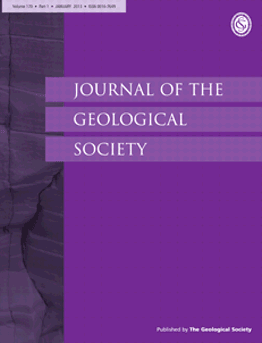
JOURNAL OF THE GEOLOGICAL SOCIETY
Pioneering Insights in Earth and Planetary SciencesJOURNAL OF THE GEOLOGICAL SOCIETY, published by GEOLOGICAL SOC PUBL HOUSE, is a premier academic journal dedicated to advancing the field of geology. With a rich history dating back to 1845 and continuously published until 2024, this journal caters to a diverse audience of researchers, professionals, and students involved in earth sciences. The journal is recognized for its high impact factor, situating it in the top Q1 category in the field of geology, as indicated by its impressive Scopus rank of #49 out of 321, positioning it at the 84th percentile in Earth and Planetary Sciences. This esteemed scholarly platform promotes rigorous peer-reviewed research, ensuring that novel findings contribute to the global geological discourse. Although it operates under a subscription model, the journal's archive offers valuable insights for anyone pursuing excellence in geological research. The JOURNAL OF THE GEOLOGICAL SOCIETY stands as a vital resource for disseminating scientific knowledge and fostering educational growth within the field.

NORWEGIAN JOURNAL OF GEOLOGY
Advancing Geoscience Through Open Access Innovation.NORWEGIAN JOURNAL OF GEOLOGY, published by the Geological Society of Norway, stands as a vital resource in the fields of geology, geochemistry, petrology, geophysics, oceanography, and paleontology. Since its transition to an Open Access model in 2015, this journal has significantly expanded its reach, allowing for greater dissemination of cutting-edge research and insights. With an ISSN of 2387-5844 and E-ISSN of 2387-5852, the journal is committed to fostering collaboration and knowledge exchange among the scientific community. The journal's categorization in the Q3 quartile across various Earth and Planetary Sciences fields underscores its status as a reputable publication, offering researchers, professionals, and students alike a platform to share their findings and advancements in geology. Continuing through its converged years from 2015 to 2024, the NORWEGIAN JOURNAL OF GEOLOGY plays a crucial role in enhancing our understanding of Earth's processes and materials, making it an important reference for anyone engaged in geoscientific research.

GEOLOGIA CROATICA
Connecting Researchers to the Heart of GeologyGEOLOGIA CROATICA is a distinguished open-access journal published by the Croatian Geological Survey, dedicated to advancing the field of Earth and planetary sciences. Since its inception in 1992, this peer-reviewed journal has become an essential resource for researchers, professionals, and students interested in various aspects of geology. With its robust impact factor and a prestigious place in Scopus rankings, ranking 127th out of 321 in Geology and 77th out of 159 in miscellaneous Earth and Planetary Sciences as of 2023, GEOLOGIA CROATICA maintains a strong international presence. It provides a platform for the dissemination of critical research findings, promoting collaboration and knowledge sharing among the global scientific community. By focusing on high-quality manuscripts that cover geological processes, hazards, and resources, this journal is pivotal for anyone looking to contribute to or expand their understanding of geological sciences. The journal's commitment to open access ensures that invaluable research is accessible to all, fostering a more informed and scientifically engaged society.
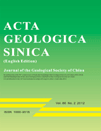
ACTA GEOLOGICA SINICA-ENGLISH EDITION
Innovating Geological Research for a Sustainable FutureACTA GEOLOGICA SINICA-ENGLISH EDITION is a distinguished academic journal published by Wiley, providing a platform for cutting-edge research in the field of geology. With an ISSN of 1000-9515 and E-ISSN 1755-6724, this journal has been a pivotal resource since its inception in 1988, catering to scholars and professionals until 2024. The journal is recognized for its high-quality articles, achieving a Q2 ranking in the field of Geology according to the 2023 category quartiles, and ranks #122 out of 321 in the Scopus Earth and Planetary Sciences sector, placing it within the 62nd percentile among its peers. Although currently not available as an open access publication, it remains a significant repository of knowledge that supports ongoing geological research and exploration. For researchers, students, and professionals looking to deepen their understanding of geological sciences, ACTA GEOLOGICA SINICA-ENGLISH EDITION stands as an essential journal, promoting collaboration and innovation in the earth sciences.
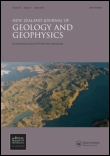
NEW ZEALAND JOURNAL OF GEOLOGY AND GEOPHYSICS
Advancing Knowledge in Geology and Geophysics.NEW ZEALAND JOURNAL OF GEOLOGY AND GEOPHYSICS, published by Taylor & Francis Ltd, stands as a prominent forum dedicated to the interdisciplinary exploration of geological and geophysical phenomena. With an impact factor that situates this journal in the prestigious Q1 category across key subjects—namely Earth and Planetary Sciences, Geology, and Geophysics—it is a critical resource for researchers, professionals, and students alike. The journal has been operational since 1958 and continues to contribute valuable insights into the complexities of the Earth's processes. Although it does not currently offer Open Access options, its broad readership benefits from an extensive archive of high-quality research findings that span from 1958 to 2024. Located in the United Kingdom, the journal remains a pivotal player in advancing the understanding of Earth's systems, making significant contributions to both academic inquiry and practical applications in the field.
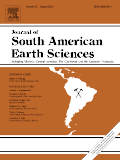
JOURNAL OF SOUTH AMERICAN EARTH SCIENCES
Advancing Knowledge in Earth-Surface ProcessesJOURNAL OF SOUTH AMERICAN EARTH SCIENCES is a premier interdisciplinary journal dedicated to publishing high-quality research in the fields of Earth-Surface Processes, Geology, and Paleontology, making it an essential resource for scientists and researchers focused on South American geology and its diverse geological phenomena. Published by Pergamon-Elsevier Science Ltd in the United Kingdom, this journal has been instrumental in disseminating groundbreaking studies since 1988, showcasing contributions that push the boundaries of knowledge in Earth and Planetary Sciences. With an impressive Scopus ranking—positioning it in the 74th percentile for Paleontology and 71st for Geology—this journal not only reflects robust academic quality but also its commitment to addressing critical geological challenges in South America. Researchers will appreciate its objective of advancing understanding of geological processes while providing insights into past, present, and future Earth environments. Although available through traditional subscription models, the journal's vast repository of articles enriches the academic landscape, facilitating the sharing of vital research among professionals, students, and geological practitioners.
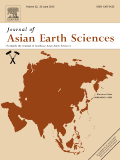
JOURNAL OF ASIAN EARTH SCIENCES
Charting New Frontiers in Asian Earth ResearchJOURNAL OF ASIAN EARTH SCIENCES, published by Pergamon-Elsevier Science Ltd, is a premier international journal dedicated to advancing the understanding of Earth Sciences, particularly within the vibrant and diverse geological landscapes of Asia. With an esteemed Impact Factor reflective of its robust scholarship, the journal is currently categorized in the Q1 quartile for both Earth-Surface Processes and Geology, highlighting its significant contribution to these fields. Researchers can access cutting-edge research spanning geophysical studies, geological formations, and environmental changes via the journal’s Open Access model, ensuring a broad dissemination of knowledge. As the journal converges its focus from 1997 to 2024, it continues to serve as a critical platform for scholars, professionals, and students aiming to explore the unique challenges and opportunities present in Asian Earth sciences. Its commendable rankings of 28th out of 179 in Earth-Surface Processes and 52nd out of 321 in Geology, demonstrate its influence and relevance in the academic community.

Austrian Journal of Earth Sciences
Connecting Scholars in Earth SciencesThe Austrian Journal of Earth Sciences, published by SCIENDO, is an esteemed open-access journal specializing in the disciplines of geology, paleontology, and stratigraphy. With an ISSN of 2072-7151, this journal has established itself as a significant platform for innovative research and scholarly communication in the earth sciences. Since its inception in 2007, it has continuously expanded its influence, achieving notable rankings in the Scopus database—#113 in Geology, #42 in Paleontology, and #21 in Stratigraphy, demonstrating its commitment to high-quality publications. The journal holds prestigious quartile rankings of Q1 in both Geology and Paleontology and Q2 in Stratigraphy as of 2023, reflecting its impact and relevance in the scientific community. Researchers and students alike are encouraged to explore and contribute to the evolving discourse within this dynamic field, as the Austrian Journal of Earth Sciences fosters collaboration and knowledge sharing across global platforms.
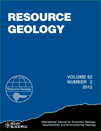
RESOURCE GEOLOGY
Pioneering Discoveries in Earth SciencesRESOURCE GEOLOGY, published by WILEY, is a peer-reviewed journal that serves as a vital platform for the dissemination of innovative research in the fields of geology and geochemistry. With an ISSN of 1344-1698 and e-ISSN 1751-3928, the journal has steadily contributed to the academic community since its inception in 1996, continuing through its planned convergence in 2024. With a Q3 ranking in both Geochemistry and Petrology and Geology categories, RESOURCE GEOLOGY is positioned within the competitive landscape of Earth and Planetary Sciences, ranked 164th and 93rd in its respective categories on Scopus, reflecting its significant contribution to the body of knowledge in these fields. While not an open-access journal, it provides access to essential research that advances our understanding of natural resources and geological processes. The journal is dedicated to publishing high-quality articles that appeal to researchers, professionals, and students looking to deepen their insight into the intricate interplay between geological phenomena and resource management.

GEOLOGICA BELGICA
Connecting Geoscientists for a Sustainable FutureGEOLOGICA BELGICA is a distinguished open access journal dedicated to advancing the field of Earth and Planetary Sciences, published by Geologica Belgica Luxemburga Scientia & Professionis. With an ISSN of 1374-8505 and E-ISSN of 2034-1954, the journal has been a beacon of knowledge since its establishment in 1998, ensuring the broad accessibility of crucial research findings. Based in Brussels, Belgium, the journal is recognized for its impactful contributions and has achieved a commendable Q2 ranking in the Earth and Planetary Sciences category for 2023. This makes it a vital resource for researchers, professionals, and students alike, encouraging the dissemination of cutting-edge research. Spanning a diverse range of topics within its scope and converging from 2007 to 2024, GEOLOGICA BELGICA remains committed to fostering dialogue and collaboration among earth scientists globally, further enhancing its relevance and influence in this essential field of study.